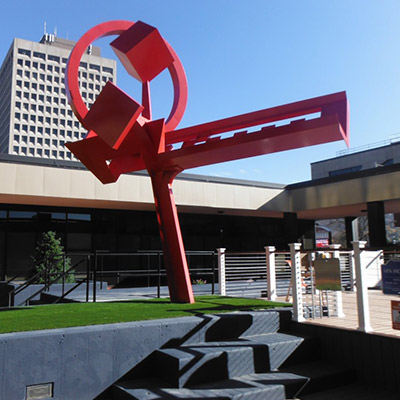Reviewed by Patrick Hao:
The Greek myth of Orpheus and Eurydice is a story of love, music and ultimately death. Those universal themes resonate throughout civilizations and cultures, making the story malleable to different cultures; from Stravinsky’s ballet, Orpheus, in 1948 to the Oscar-winning Marcel Camus film, Black Orpheus, set in the favela of Rio de Janeiro. The Anderson Center this weekend presents their version of Orpheus, this time set in an African village and like the adaptations before them, this dance show is a vibrant ode of African music, dance and of course love.
The show is broken up into eight separate dances highlighting the story of Orpheus and Eurydice. Orpheus (Marcol Rodriguez) is a flute player, whose music brings joy to the African village and soon he falls in love with Euydice (Taire Herasme). But, when she dies from a snake bite, Orpheus must go to the Underworld to plea for her life back.
The first number, titled “It’s dawn in the village”, is a burst of energy that woke up the crowd not knowing what to expect. The music directed by Dr. James Burns and an African band ensemble including a chorus and African drums created such great music that it was hard to restrain the smile that slowly appeared on my face.
Orpheus is a beautiful combination of music and dance. The joy and exuberance by the dancers was even able to reflect off the shadows they create on the side of the stage. As the show moves on, the music becomes somber as the show becomes somber. The second half, set in the Underworld is organ based as opposed to the rhythmic percussions of the first half, creating an eerie feeling of unnaturalism.
The choreography by Binghamton professors and lecturers (Andrew Horowitz, Joellen Kuhlman, Samuel Nyamumae and Stephanie Surokaway) is a celebration, not just of traditional African dance but of many dances. Each dance serves a purpose to the story, not just as a showcase for the talented ensemble. The villagers are pure rhythm and movement, an encapsulation of being alive. Hades’ demons are represented by tap and ultimately step to distinguish from the rest of the show and present intimidation.
But, here is where the show becomes disappointing. The running time for the show clocks in at slightly over an hour. That condensed running time forces the end to feel rushed and ultimately dissatisfying. The ending of Orpheus is one of the prime examples of Aristotelian catharsis. By the end, the audience should have the emotional gut punch. But, the production was not able to milk that the pathos that is inherent within the story.
That does not mean avoid the show. Rather, it is a small blemish in one of the most fun times I had watching any form of entertainment. Orpheus is a celebration of life’s most cherished things after all; love and music. And who wants to miss a celebration.




































